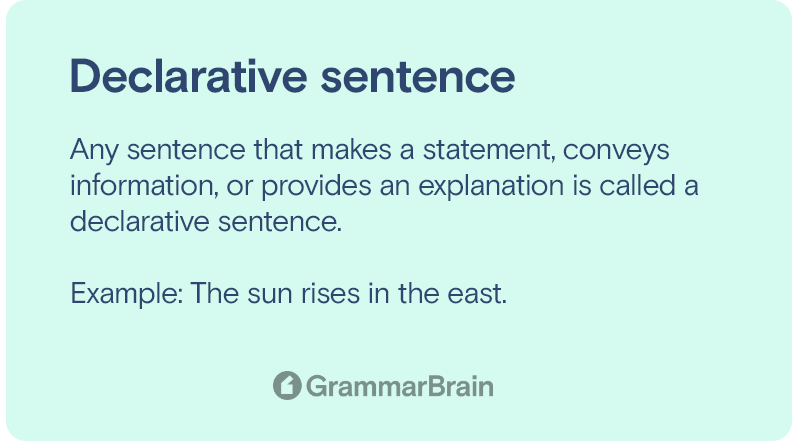What are the various types of sentences? How do they work? How are the various sentence types formed in the English language? These are all great questions when it comes to grammar and the English language. Let’s dig into these questions and answer them in this comprehensive guide.
What are the different types of sentences?
The sentences in the English language are divided into four types, which are:
- Declarative Sentence
- Interrogative Sentence
- Imperative Sentence
- Exclamatory Sentence
Here is a detailed breakdown of each of them:
Four types of sentences and their structure
Declarative sentence
A declarative sentence or a declarative statement conveys information that can be an opinion, fact, or any other information. These types of sentences end with a period at the end of the sentence. The structure of a declarative sentence is “Subject + Verb + A Few Other Words”.
Few examples:
- He enjoys drinking milk in the morning.
- She danced with the groom last night at the wedding party.
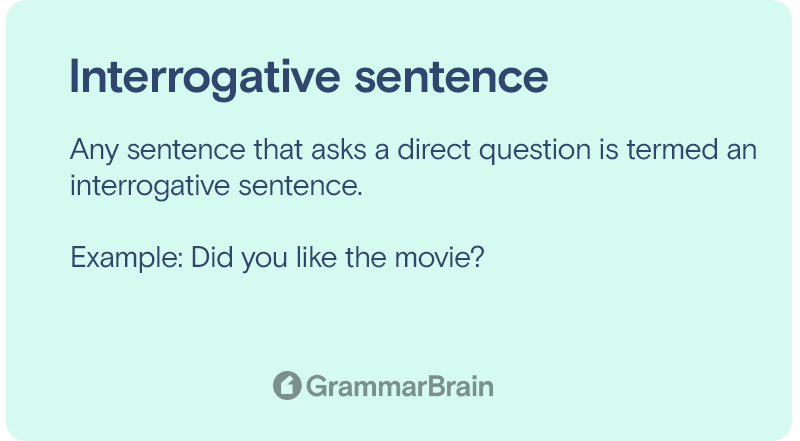
Interrogative sentence
It is a sentence that asks questions about something or someone. In such sentences, the first word is an interrogative pronoun, and the sentences end with question marks. Besides this, the sentences also begin with auxiliary or modal verbs. Some of the interrogative pronouns are “which”, “what”, “where”, “whose”, and “whom”.
Here is the formula of the interrogative sentence.
When constructing a sentence with an interrogative pronoun, the formula is “Interrogative pronoun + auxiliary verb + subject + verb + a few other words”.
When constructing a sentence with an auxiliary verb, the formula is “Auxiliary verb + subject + main verb + a few other words”.
Few examples:
- What is Shawn eating? In this example, the interrogative pronoun is “what”, the auxiliary verb is “is”, the subject is “Shawn”, and “eating” is the verb.
- Did he enjoy the party yesterday? Here, “did” is the auxiliary verb, the subject is “he”, and “enjoy” is the main verb.
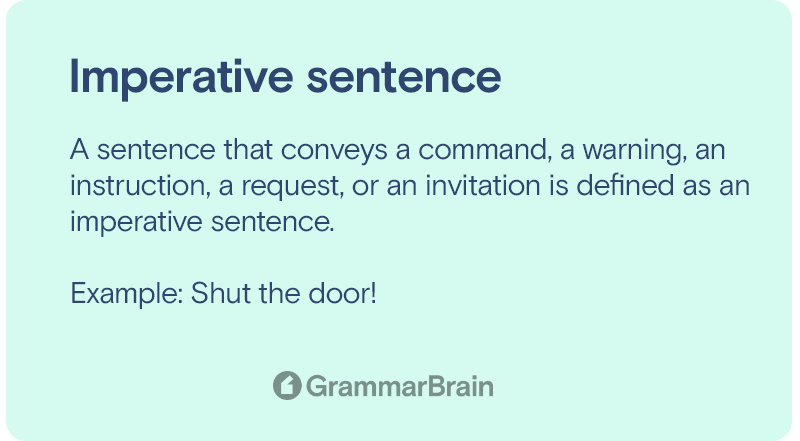
Imperative sentence
An imperative sentence is a sentence that directs a command or a request. For example, “Do the dishes”. In imperative sentences, there is no subject, instead, in these sentences, a command is indirectly pointed to a person.
In the example, the command of doing the dishes is implied to a person. The structure of an imperative sentence is “Verb + A Few Other words”.
Few examples:
- Drape the window with curtains.
- Call the police.
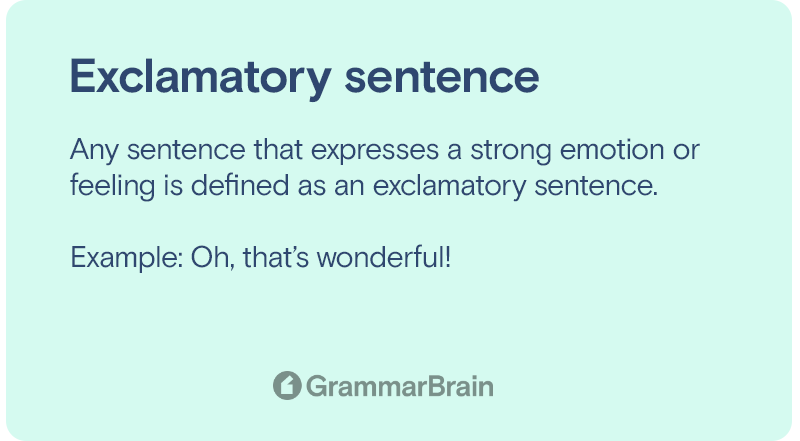
Exclamatory sentence
An exclamatory sentence is a sentence that conveys emotions. Such sentences are usually used in informal settings and not in formal settings. Exclamatory sentences end with an exclamation mark.
Few examples:
- What a silly girl she is!
- How gracefully she dances!
That said, sentences come in four types of structure. Here is an overview of the four structures and also the examples of each of the sentences in these structures.
Four types of sentence structures
The four types of sentence structures are:
- The Simple Sentence Structure
- The Compound Sentence Structure
- The Complex Sentence Structure
- The Compound-Complex Sentence Structure
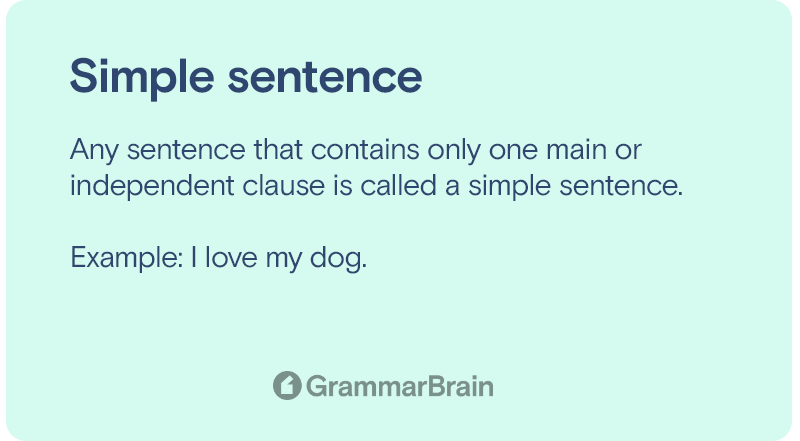
The simple sentence structure
A simple sentence expresses an independent idea that consists of a subject and a predicate.
Examples of declarative sentences in a simple sentence structure
- Sam bought a new car.
- He eats sandwiches for breakfast every day.
Examples of interrogative sentences in a simple sentence structure
- Who is Sam sitting with?
- Did he attend the meeting yesterday?
Examples of imperative sentences in a simple sentence structure
- Wash the clothes.
- Clean the house.
Examples of exclamatory sentences in a simple sentence structure
- What a cheat he is!
- Wow, what a wonderful movie that was!
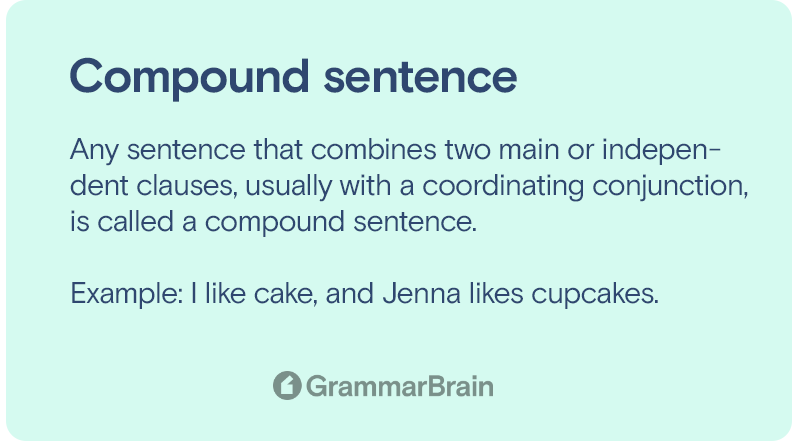
The compound sentence structure
A compound sentence structure is a sentence that consists of two simple sentences which are joined by conjunctions or semi-colons.
Examples of declarative sentences in compound sentence structure
- She wants to prepare noodles but she doesn’t know the ingredients. Here, two sentences are joined with a “but” conjunction.
- Amelie plans to celebrate her birthday party with friends today and with her family the next day.
Examples of interrogative sentences in compound sentence structure
- Where are you sitting and who are you sitting next to?
- What is Sam eating and where did he get the food from?
Examples of imperative sentences in compound sentence structure
- Put the clothes in the washing machine and dry them outside.
- Order a salad or purchase a bag of chips for lunch.
Examples of exclamatory sentences in compound sentence structure
- My new assignment is great and offers many opportunities!
- Fantastic game played yesterday, you won the football match!
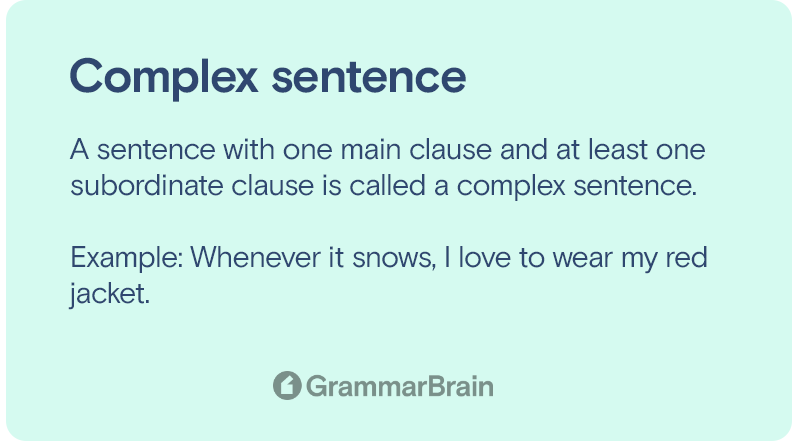
The complex sentence structure
A complex sentence structure has a main clause and a dependent clause. Both clauses are joined using subordinate conjunctions like when, because, if, etc.
Examples of declarative sentences in complex sentence structure
- I ate a sandwich when I entered the coffee shop.
- Sam started eating vegetables because he wants to maintain his health.
Examples of interrogative sentences in complex sentence structure
- Did she skip the exam because she did not prepare?
- Do you drink milk when you are dieting?
Examples of imperative sentences in complex sentence structure
- Never disturb me when I am studying.
- Cover the car with a covering sheet because it is going to rain.
Examples of exclamatory sentences in complex sentence structure
- James is excited to introduce the new boss once the employees arrive!
- She feels anxious when her brother speeds up the car!
The compound-complex sentence structure
A compound-complex sentence structure is a sentence that consists of two clauses and a dependent clause. The sentences in the compound structure are joined by conjunctions and a comma is used to link with the complex sentence.
Examples of declarative sentences in compound-complex structure
- He hates the decoration of the party and he hates the food, although he loves the music.
- Although Sam finds the rides in the water park expensive, he thinks the food is cheap and he finds shopping prices reasonable.
Examples of interrogative sentences in compound-complex structure
- Has Molly invited you and Sam to the party, if not, will you ask her for the invitation?
- Is the project completed and submitted to the client, if not, when will you submit it?
Examples of imperative sentences in compound-complex structure
- Please call me or message me, when there is an emergency.
- Eat fruits and vegetables, because they are good for your health.
Examples of exclamatory sentences in compound-complex structure
- When I become a successful movie star, my mother will be thrilled and my father will be elated!
- When I get the promotion, I will feel happy and proud!
How to construct negative sentences with declarative, imperative, and interrogative forms
Here are a few examples to explain how they are constructed.
Declarative negative sentences examples
To create a negative declarative sentence, the negative word should be placed between the subject and the verb.
Few examples:
- She doesn’t like tea in the morning.
- They did not go to the wedding party yesterday.
Imperative negative sentences examples
To construct negative imperative sentences, add a negative word like don’t and never, before the verb in the structure.
Few examples:
- Don’t eat junk food every day.
- Never ask for a calculator in the exam.
Interrogative negative sentences examples
When using an auxiliary verb to construct an interrogative negative sentence, the word “not” is added to the auxiliary verb.
Few examples:
- Don’t you eat sandwiches every day in the morning for breakfast?
- Didn’t she go shopping for buying clothes yesterday?
When using an interrogative noun to construct a negative interrogative sentence, the word “not” is placed between the auxiliary verb and the subject.
Few examples:
- Who is not cleaning the dishes after dinner?
- Why aren’t you applying for the college scholarship?
FAQs
What is the definition of a sentence?
What is the difference between a phrase and a sentence?
A phrase is also made up of a string of words that makes partial sense or does not make complete sense. On the other hand, a sentence is made up of a string of words that conveys a thought completely. It makes complete sense, unlike a phrase that makes partial sense.
Sentence examples:
- He will get up in the morning at 6 A.M.
- She drinks coffee every day in the evening after work
Phrase examples:
- The national bird of India. This statement makes partial sense.
- The employees of the company. This statement also makes partial sense.
What are the different interrogative sentence forms?
Here are a couple of different forms of interrogative sentences:
Yes or No question
The answer to such questions is either “yes” or “no”. For example, “Do you like pasta?”. The answer could be “yes” or “no”.
Choices
The question gives choices between two things. For example, “Do you want an omelet or cereal for breakfast”. The question gives a choice between two items.
Sources
- Types of Sentences
- The 4 English Sentence Types | Grammar | EnglishClub
- Types of Sentences
- 4 Types of Sentences: English Language Sentences Explained
- Types of Sentences with Examples, Uses in English
Inside this article
Fact checked:
Content is rigorously reviewed by a team of qualified and experienced fact checkers. Fact checkers review articles for factual accuracy, relevance, and timeliness. Learn more.
Core lessons
Glossary
- Abstract Noun
- Accusative Case
- Anecdote
- Antonym
- Active Sentence
- Adverb
- Adjective
- Allegory
- Alliteration
- Adjective Clause
- Adjective Phrase
- Ampersand
- Anastrophe
- Adverbial Clause
- Appositive Phrase
- Clause
- Compound Adjective
- Complex Sentence
- Compound Words
- Compound Predicate
- Common Noun
- Comparative Adjective
- Comparative and Superlative
- Compound Noun
- Compound Subject
- Compound Sentence
- Copular Verb
- Collective Noun
- Colloquialism
- Conciseness
- Consonance
- Conditional
- Concrete Noun
- Conjunction
- Conjugation
- Conditional Sentence
- Comma Splice
- Correlative Conjunction
- Coordinating Conjunction
- Coordinate Adjective
- Cumulative Adjective
- Dative Case
- Determiner
- Declarative Sentence
- Declarative Statement
- Direct Object Pronoun
- Direct Object
- Diction
- Diphthong
- Dangling Modifier
- Demonstrative Pronoun
- Demonstrative Adjective
- Direct Characterization
- Definite Article
- Doublespeak
- False Dilemma Fallacy
- Future Perfect Progressive
- Future Simple
- Future Perfect Continuous
- Future Perfect
- First Conditional
- Irregular Adjective
- Irregular Verb
- Imperative Sentence
- Indefinite Article
- Intransitive Verb
- Introductory Phrase
- Indefinite Pronoun
- Indirect Characterization
- Interrogative Sentence
- Intensive Pronoun
- Inanimate Object
- Indefinite Tense
- Infinitive Phrase
- Interjection
- Intensifier
- Infinitive
- Indicative Mood
- Participle
- Parallelism
- Prepositional Phrase
- Past Simple Tense
- Past Continuous Tense
- Past Perfect Tense
- Past Progressive Tense
- Present Simple Tense
- Present Perfect Tense
- Personal Pronoun
- Personification
- Persuasive Writing
- Parallel Structure
- Phrasal Verb
- Predicate Adjective
- Predicate Nominative
- Phonetic Language
- Plural Noun
- Punctuation
- Punctuation Marks
- Preposition
- Preposition of Place
- Parts of Speech
- Possessive Adjective
- Possessive Determiner
- Possessive Case
- Possessive Noun
- Proper Adjective
- Proper Noun
- Present Participle
- Prefix
- Predicate

